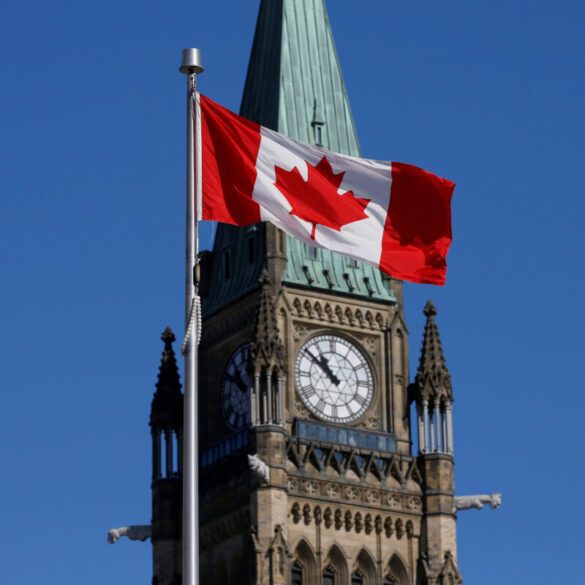
A Canadian flag flies in front of the Peace Tower on Parliament Hill in Ottawa, Ontario, Canada, March 22, 2017. REUTERS/Chris Wattie/File Photo
Executives and upper management positions in the federal government were paid over $190 million in bonuses during the pandemic year of 2021, an Inquiry Of Ministry tabled in the house of commons shows.
According to Blacklocks Reporter, the largest payout went to 295 executives that made up 96 percent of upper management at the department of justice; $17.9 million was allocated among them.
A total of $5.5 million went to the managers at the Office of the Governor General’s Secretary, the Communications Security Establishment, Economic Development for Québec, Economic Development Agency for Southern Ontario, and Financial Transactions and Reports Analysis Centre.
At 23 other federal departments, 95 percent of the top staff, executives, or those with qualifications above executive received bonuses. This included the departments of heritage, finance, fisheries, foreign affairs, indigenous services, infrastructure, justice, public safety, public works, and transport.
“Canada has a world class public service with employees committed to providing the highest level of service to Canadians,” Treasury Board President Mona Fortier wrote in the inquiry. “In fact, Canada’s public service is regularly recognized globally for its quality and effectiveness.”
The bonuses were referred to as “performance pay.” Fortier said such incentive plans are common among Canadian private and public sector company executives. The inquiry did not provide details about which individuals received payments.
Call For Greater Transparency
According to Blacklock’s, “Access To Information records from Crown agencies have identified bonus payments as routine regardless of results.”
In 2020, the Canadian Tourism Commission paid its executives $32,652 each—even though tourism was highly restricted at the height of the pandemic—while laying off 9 percent of its staff.
The CBC paid out $30.4 million in pandemic bonuses and still sought more subsidies. Blacklock’s reported that the public broadcaster paid out $15 million in bonuses in 2020 and $15.4 million the following year, but still complained of being under “immense pressure” and requested $21 million to supplement the annual $1.3 billion government grant it receives.
In a separate article, Blacklock’s reported that on Sept. 27, Sen. Percy Downe proposed an amendment to the Broadcasting Act that would force CBC to disclose the top salaries of announcers and executives. He said anyone who received a salary higher than a senator, who makes $164,500 a year, should have their salary disclosed, and that such transparency would benefit all Canadians.
“We only know that five CBC staff earn between $250,000 and $300,000 with an average salary of $342,000,” Downe said. “No names, no programs.”
Downe said top earners at the British Broadcasting Corporation have a wage disclosure mandate.
“As a public broadcaster largely funded by taxpayers, the CBC has a greater obligation than private broadcasters to be open about how it spends that money,” Downe said in the Senate.
“It’s not fair to ask struggling taxpayers to pay higher taxes so the taxpayer-funded CBC can give itself millions in bonuses and pay raises during a pandemic,” said Franco Terrazzano, federal director of the Canadian Taxpayers Federation, Postmedia reported.
